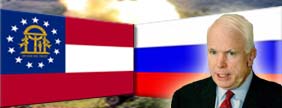Russia-Georgia war puts focus on McCain’s hard line on Russia
 Washington, Aug. 13 : The conflict between Russia and Georgia has refocused attention on the increasingly hard line that Senator John McCain has taken against Russia in recent years, reports the New York Times.
Washington, Aug. 13 : The conflict between Russia and Georgia has refocused attention on the increasingly hard line that Senator John McCain has taken against Russia in recent years, reports the New York Times.
According to the paper, McCain has called for expelling what he has called a “revanchist Russia” from meetings of the Group of Eight, the organization of leading industrialized nations.
He had also urged President Bush to boycott the group’s meeting in St. Petersburg in 2006, but in vain.
Some so-called realist foreign policy experts have warned that isolating Russia would do little to encourage it to change. They have derided McCain’s hard line against Moscow as provocative, and possibly dangerous.
Neo-conservatives, who deem promoting democracy a paramount goal, see McCain’s position as principled, and prescient.
Now, with Russia moving forcefully into Georgia as McCain’s views are being scrutinized as never before through the prism of Russia’s invasion.
McCain championing of the Georgian cause can also be attributed to his friendship with Georgia President Mikheil Saakashvili.
McCain’s top foreign policy adviser, Randy Scheunemann, lobbied on behalf of the Georgian government until March, and McCain has long embraced Georgia’s efforts to move toward joining NATO, which has been seen as part of a broader strategy to contain Russia by admitting its old satellites and former Soviet republics into the alliance.
“NATO’s decision to withhold a membership action plan for Georgia might have been viewed as a green light by Russia for its attacks on Georgia,” McCain told reporters on Monday in Erie, Pennsylvania.
McCain’s probable Democratic opponent, Senator Barack Obama, has made clear he favors more engagement with Russia.
The question of how to handle a Russia that is rich with oil revenues and increasingly independent has divided the American foreign policy establishment.
Charles King, a professor of international affairs at Georgetown University and the author of “The Ghost of Freedom: A History of the Caucasus,” said that rhetoric like McCain’s might have spurred Georgia to act unwisely.
McCain acknowledged in a recent interview that his stance on Russia had divided some of his foreign policy advisers.
Robert Kagan, a senior associate at the Carnegie Endowment for International Peace and a top McCain foreign policy adviser, said that people who found McCain’s rhetoric on Russia inflammatory were living in denial. (ANI)